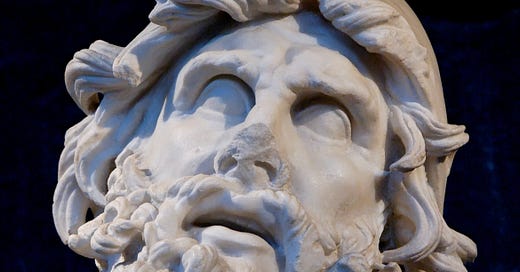I began reading Joseph Campbell in early 2016 following an abrupt and aggressive awakening. I had an onslaught of enigmatic experiences following a detachment from what seemed malevolent in nature. Fearfully, I bargained with the only one I knew to bargain with and a response came with might. A sliver opened in the fabric of our reality, then it closed, exposing a glimpse into greater laws and incontestable truths. Such a profound experience cannot be condensed and as I attempted to internalize it, I nurtured my curiosity with authors such as Thomas P. Fusco, Carlos Castaneda, and Joseph Campbell.
One of Campbell’s central ideas was a recurring storyline in both ancient and modern folklore, mythologies and religions. An archetypal hero on a quest to pursue a greater calling, crosses a threshold into a series of initiations before attaining their boon and returning with a deeper knowledge to bestow upon the people. Campbell took it further and argued that this narrative is embedded into the essence of our existence, every human to have ever walked the earth, their own hero on their own journey. The monomyth; one great cultural storyline.

As I read Campbell, I wrote Realms. It provided a conceptual through-line while I attempted to capture my unexplainable encounter; a protagonist confronting their “darkest night of the soul”1 calls for supernatural assistance and is lifted towards enlightenment. At its most aligned, certain lyrics written months, even years in advance, fit perfectly into cadence and context. The Hero with a Thousand Faces became both a reference and a key. As my relationship with Campbell deepened, I seemingly began to uncover more of his ideas already expressed in my work. Explanations could be plentiful but to assume credibility in his discoveries; maybe a greater narrative is at play if one chooses to acknowledge it.
I’m challenged by the idea of Destiny, it feels too passive. Campbell offers a more accessible greatness as long as one answers a call. The quest can be of any and all extremities and is usually one of physical pursuit and self-discovery. The Boon, or symbol of achievement in the quest may come in any form, from a profound clarity to a tangible relic.
Campbell proposed that to engage in this pursuit activates the supernatural. Our brains are hardwired to recognize patterns, even create them in an effort to rationalize. I struggle with taking the credit. The specificity in compounding coincidences, as they reference each other and all acting as road signs leaves few choices but to follow. The moment is as fantastical. Analytical psychologist, Carl Yung, coined the term ‘synchronicity’ and further collaborated on the concept with Nobel Laureate, Wolfgang Pauli. Used "to describe circumstances that appear meaningfully related yet lack a causal connection.” Studies have also showed that experiencing an overabundance of these meaningful coincidences could be a characteristic of the earliest stages of schizophrenic delusion.
Supernatural assistance sits well in mythology and folklore, from guiding dreams to shapeshifting entities interjecting for the sake of support, clarity and forward movement. A desperation in my own spiritual crisis brought me to prayer - my Catholic upbringing afforded a willingness to believe. The act was less passive meditation and one of direct invocation. My skepticism was shattered.
Ultimately, the lesson is one in trust. With honest intention and a desire to discover we activate unimaginable connections behind the scenes. An architecture that I cannot comprehend but has proven itself in my challenging of it. Campbell urges, “follow your bliss” - jump and the net will appear. The calling comes as an inner urgency, the catch is to accept the pursuit. And in the most desolate corners of the darkest caves, put it all to the test and find the courage to summon assistance.
“Trembling in fear with a reason to exist at the end of that Awakening Fist.”
an initiation or concept from Campbell’s The Hero With A Thousand Faces.
“The dark night of the soul comes just before a revelation”



